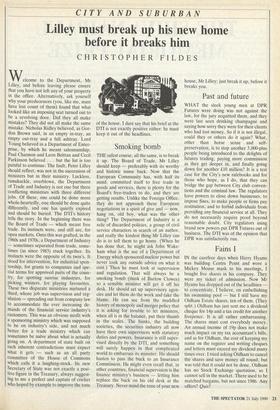CITY AND SUBURBAN
Lilley must break up his new home before it breaks him
CHRISTOPHER F ILDES
Welcome to the Department, Mr Lilley, and before leaving please ensure that you have not left any of your property in the office. Alternatively, ask yourself why your predecessors (you, like me, must have lost count of them) found that what looked like an imposing seat turned out to be a revolving door. Did they all make mistakes? They did not all make the same mistake. Nicholas Ridley believed, as Gor- don Brown said, in an empty in-tray, an empty out-tray and a full ashtray. Lord Young believed in a Department of Enter- prise, by which he meant salesmanship. Paul Channon and Leon Brittan and Cecil Parkinson believed . . . but the list is too painful to continue. The fault, Peter Lilley should reflect, was not in the succession of ministers but in their ministry. Luckless, ramshackle, overblown, the Department of Trade and Industry is not one but three conflicting ministries with three different jobs. Of these, one could be done more whole-heartedly, one should be done quite differently, and one has quietly expired and should be buried. The DTI's history tells the story. In the beginning there was the Board of Trade — which meant free trade. Its instincts were, and still are, for open markets. Onto this was grafted, in the 1960s and 1970s, a Department of Industry — sometimes separated from trade, some- times (as since 1983) stuck together. Its instincts were the opposite of its twin's. It stood for intervention, for industrial spon- sorship, for grants to companies arid spe- cial terms for approved parts of the coun- try, for spotting sunrise industries, for picking winners, for playing favourites. These two disparate ministries nurtured a third, whose job was supervision and reg- ulation — spreading out from company law to accommodate the ever increasing de- mands of the financial service industry's customers. This was an obvious misfit with a sponsoring ministry which was supposed to be on industry's side, and not much better for a trade ministry which can sometimes be naive about what is actually going on. A department of state built on such inherent contradictions must expect what it gets — such as an all, party committee of the House of Commons which calls it a laughing-stock. Its new Secretary of State was not exactly a posi- tive figure in the Treasury, always suggest- ing to me a prefect and captain of cricket who hoped by example to improve the tone
of the house. I dare say that his brief at the DTI is not exactly positive either: he must keep it out of the headlines.


















































 Previous page
Previous page